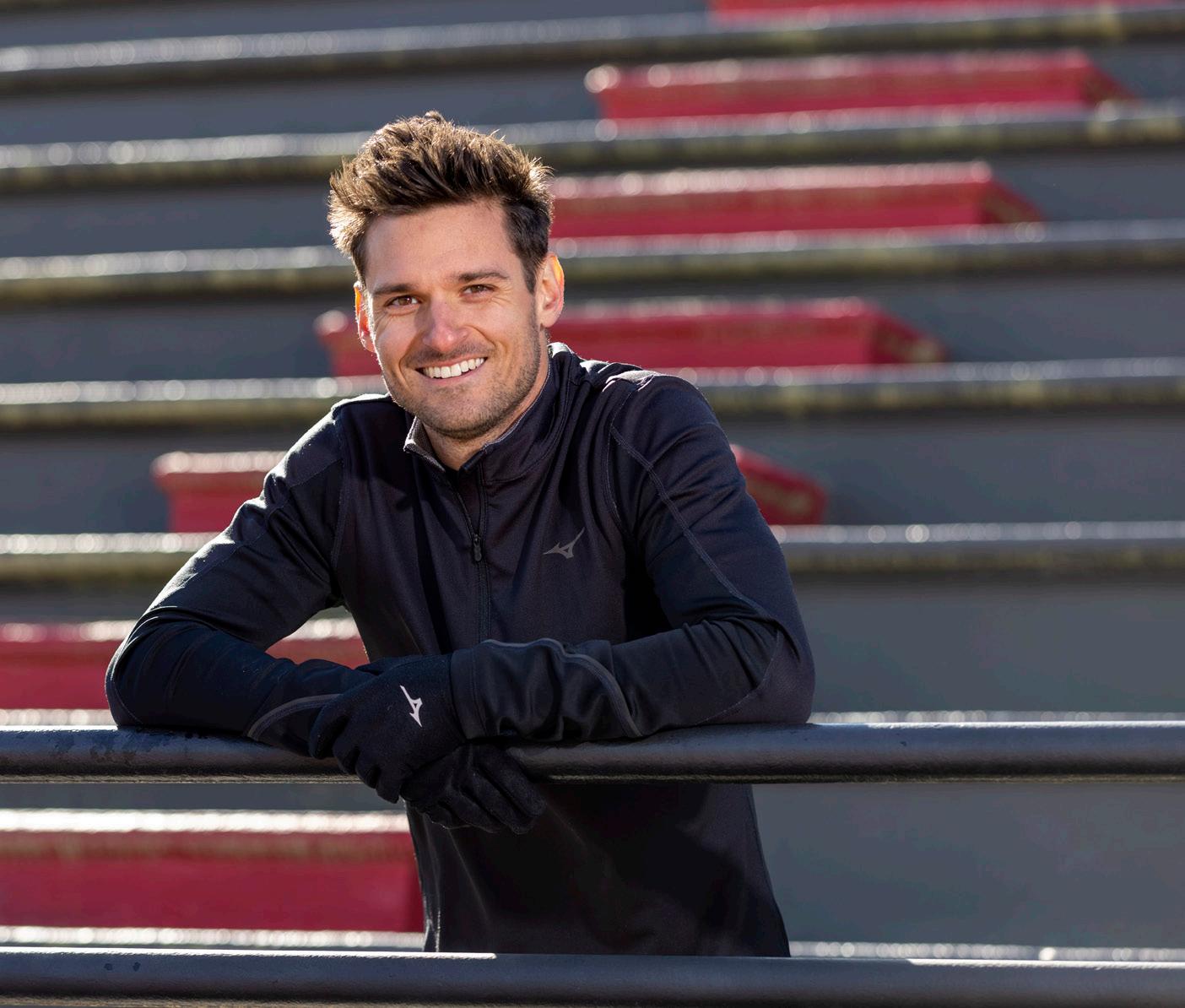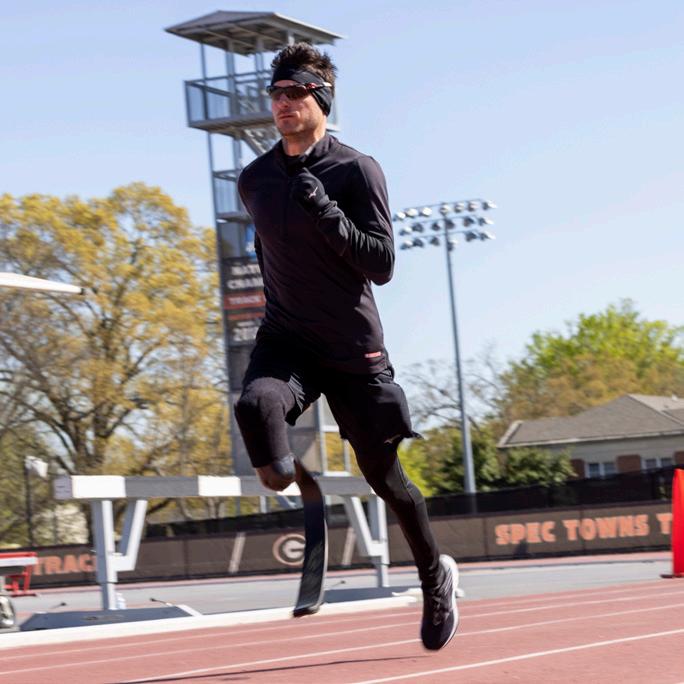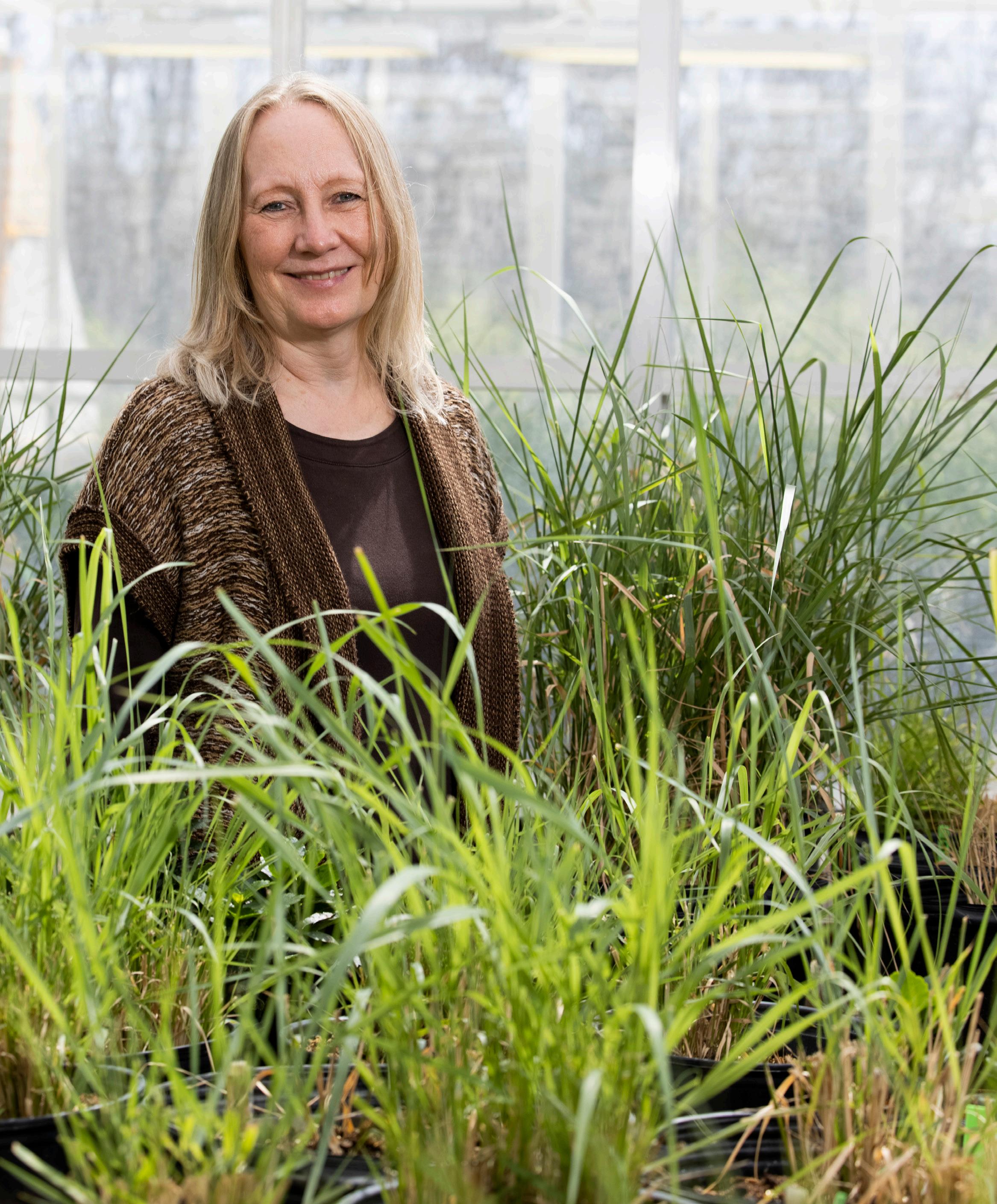
6 minute read
Faculty Focus
APPLAUSE FOR ALUMNI
Running Through Adversity
Jarryd Wallace AB ’19

peter frey
When he was just 19 years old, Jarryd Wallace thought he’d never run again.
As a former state champion cross country runner at Oconee High School, Wallace AB ’19 was shocked when doctors told him his only chance at living a normal life, much less being an athlete, was to amputate his right leg from the knee down.
Wallace first felt pain in his leg during his junior year of high school. He was diagnosed with compartment syndrome, a common problem for runners. But the pain didn’t go away, and Wallace had his first surgery to relieve the pressure in his leg.
When the bandages were removed four days later, it was clear that something had gone wrong. The suture from his surgery had come undone and blood had seeped into his leg. Sixty percent of his muscle from the knee down was dead. To get his leg back to normal, Wallace submitted
peter frey
to almost two years of surgery and treatments. None of it worked.
“I went from being extremely active to sleeping on the floor of my parents’ room being completely immobile and needing assistance for almost everything,” he recalls.
UGA honored the athletic scholarship if offered to Wallace before his injuries, so Wallace was able to study close to home. But early on, he started depending on alcohol and drugs to ease the ongoing physical and emotional pain. After rediscovering his Christian faith, Wallace visited the doctor who told him he would need to amputate his leg if he ever wanted to have a chance at being an athlete again. The decision for Wallace was surprisingly easy.
“I was comfortable and trusted the Lord’s plan for me, and realized that it was different than the one I had for myself. I understood that the loss of the leg was not the loss of my life. If anything, it became a second opportunity at life,” he says. “I don’t know how to explain how a 19-yearold can make that decision other than just having the peace that came with trusting that plan.”
The year after the surgery removed half his leg, Wallace ran the fastest time in the world in the 100-meter race at the Parapan American Games. Since then, he’s been to two Paralympic Games, held four world records, earned three gold medals in world championship events, and won multiple national championships.
Wallace is still working with UGA trainers as he gears up for the upcoming Paralympics in Tokyo, which were postponed one year because of the pandemic. So Wallace took advantage of the extra time.
“Looking back, I think the postponement for me, mentally and physically, might have been a blessing in disguise. This year has really given me the opportunity to step back, focus on the process, and get healthy.”
At the same time, Wallace is working to pave the way for other amputee athletes. He’s collaborating with the Japanese company Xiborg to develop a new running blade. So far, there are only a handful of companies that make them, and Wallace hopes to push the industry forward. As director of the company’s Affordable Blade Project, Wallace hopes to create greater accessibility to cost-effective running blades and give more people the chance to run again, while also giving them some hope for their future.
“So many times we let our present circumstances dictate our drive and our goals. But the only way to move beyond whatever your circumstance may be is to begin having a dream and letting those desires dictate your response. Allowing ourselves to look ahead and letting that fuel the decisions we make.”
Trust Company of Tennessee in Chattanooga. Chanda White MEd ’09 is the director of social services for Brightmoor Hospice in Griffin.
environment & design
Joshua Gillespie MHP ’12 is director of planning and development services for Orange County, VA.
family and consumer sciences
Sarah Brunnig MS ’82 is a lecturer at the University of Florida teaching the fundamentals of human nutrition.
law
Jeffrey Foster JD ’93 was named supreme court judge for the Alcovy Judicial Circuit in Monroe. Stacey Chavis MSL ’19 is an adjunct professor of political science at Oglethorpe University in Atlanta.
public health
William Potts-Datema DRPH ’18 was named treasurer of the national board of the Society for Public Health Education and is president of the Foundation for the Advancement of Health Education.
social work
Schnavia Hatcher MSW ’98 is the dean of the School of Social Work at the University of Alabama in Tuscaloosa.

want to reach the bulldog nation?
@universityofga
advertise in Georgia Magazine
Published quarterly and mailed to the household, your advertising message reaches your audience directly, giving you one of the strongest demographic buys in the region. For information on advertising in the award-winning Georgia Magazine, contact gmsales@uga.edu or 706-542-9877.
send us your notes Help UGA and your classmates keep up with what’s happening in your life—both personally and professionally—by sending Class Notes items to one of the addresses listed below. And please include your current address to help us keep our alumni database up to date. If you send a photo, please make sure it is a resolution of 300 dpi.
Class Notes is the first section we work on, so keep these deadlines in mind: for the Spring (March) issue, submit by December 1; for Summer (June), submit by March 1; for Fall (September), submit by June 1; for Winter (December), submit by September 1.
Quickest way to send Class Notes E: gmeditor@uga.edu W: ugamagazine.uga.edu Or send a letter to: Georgia Magazine 286 Oconee Street, Suite 200 North University of Georgia Athens, GA 30602-1999 UGA Alumni Association Please submit online at alumni.uga.edu/classnote
Debra Mohnen
Georgia Athletic Association Professor in Complex Carbohydrate Research Professor of Biochemistry and Molecular Biology Franklin College of Arts & Sciences Member of the Complex Carbohydrate Research Center
“Many scientists and industrial engineers think of pectin too simply, and this inhibits our ability to take advantage of pectin’s structural and functional complexity to improve plants and develop carbonneutral products. Those products will be essential as the state and nation move toward a sustainable economy and society. I am honored to work with and help train the excellent students and researchers at the University of Georgia as we continue the exciting challenge of understanding the molecular mechanisms for making and using this multifunctional polymer.”

Pectin is more than just the thing your grandmother used to thicken her homemade jam. At the University of Georgia, researchers like Debra Mohnen are studying the compound, which is essential in every plant cell. Without pectin, plants can’t grow, stand upright, reproduce, or fight back against diseasecausing microorganisms. By learning more about pectin’s structure and how it is synthesized, researchers can potentially alter plants to grow larger and increase crop yields, bringing the world closer to a more secure food supply.
andrew davis tucker
Endowed chairs—positions that receive supplemental support generated from private donations—are essential to recruiting and retaining leading faculty who are committed to world-changing research and preparing the next generation of problem-solvers, pioneers, and leaders. Learn more about supporting UGA’s leading faculty at GIVE.UGA.EDU.

286 Oconee Street, Suite 200 North University of Georgia, Athens, GA 30602
Change Service Requested Non-Profit Org. US Postage PAID University of Georgia





